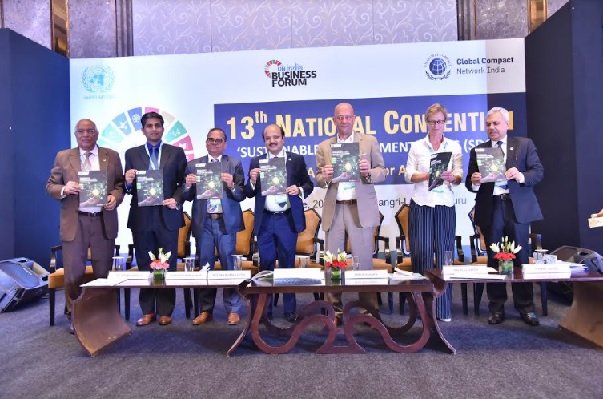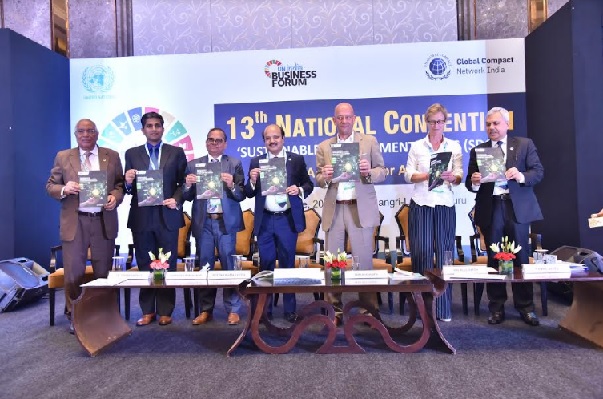
Bengaluru, Karnataka, India
- GCNI-Accenture CEOs study reveals that 86% Indian CEOs as compared to 78% globally are aware of how their companies can contribute to the SDGs
Global Compact Network India (GCNI), a local arm of the United Nations Global Compact, New York held its 13th edition of its annual flagship event in Bengaluru on the 8th of June, 2018. The overlying theme for the event focused on ‘Sustainable Development Goals (SDGs): A Blueprint for Action’. The event was attended by the eminent personalities including CEOs, CXOs & Heads from Corporates, PSUs, Academia, Civil Society Organizations and UN entities from across the world.
 |
L-R: Dr. Uddesh Kholi, Mr. Vishvesh Prabhakar, Mr. D.K. Hota, Mr. Shashi Shanker, Mr. Yuri Afanasiev,
Ms. Sue Allchurch, Mr. Kamal Singh
The event comes after another significant event, the UN India Business Forum which was jointly hosted by the GCNI and UN, with Accenture as the Knowledge Partner. This convention was led by Mr. D. K. Hota, CMD, BEML.
Mr. Amitabh Kant, CEO, NITI Aayog, addressed the session via Video conference said “I would like to congratulate Global Compact Network India, ONGC and BEML for organizing such a grand event on Sustainable Development Goals. Indian government has shown a firm faith in the Sustainable Development Goals with our Prime Minister expressing his commitment by saying that sustainable development is a matter of faith for our country. As we target 10% growth in the next couple of years, it is imperative that we ensure an inclusive development. And I think we are trying to make an impact by touching across the spectrum of the goals. These goals, also known as Global Goals, build on the success of the Millennium Development Goals (MDG’s) and call for action by all countries to promote prosperity while protecting the planet. These broad goals recognize that complex sustainability challenges cannot be effectively resolved by disintegrated initiatives.”
Speakers included Dr. Uddesh Kohli (Chair, Admin Committee, GCNI), Mr. Yuri Afanasiev (UN Resident Coordinator India and UNDP Resident Representative in India), Mr. Shashi Shanker (President, GCNI & CMD, ONGC), Ms. Sue Allchurch (Chief Outreach and Engagement UNGC, New York), Mr. Vishvesh Prabhakar (MD, Sustainability, Accenture Strategy India), Dr. H Chaturvedi (Director, BIMTECH), Dr. Bhaskar Chatterjee, Secretary General, Indian Steel Association, Mr. Krish Shankar, Global Head, HR, Infosys Ltd., Brig. Rajiv Williams, Corporate Head-CSR, Jindal Stainless Ltd., Mr. Ajay Poddar, Managing Director, Synergy Environics, Ms. Vaishali Sinha, Director, ReNew Power, Shri Kapil Mohan, IAS, Principal Secretary, Dept of Housing, Govt of Karnataka, including other dignitaries.
Speaking at the convention, Mr. Kamal Singh, Executive Director, Global Compact Network India said, “The theme of the convention “Blueprint for Action” puts emphasis on the real on-ground actions that the businesses need to adopt an impact on achieving the SDGs and to create economic value for the nation. “Blueprint for action” entails concepts such as organizational performance for SDGs, circular economy etc. which India needs to follow in the coming years to ensure that we are on path to reach our goals. Moving from discussions and preliminary initiatives to concrete and scalable actions that are sustainable is the need of the hour and we at this convention have got together and successfully addressed this.”
The unique feature of the Convention was the launch of GCNI – Accenture CEO Study, Exclusive CEO Panel, Concurrent Sessions on SDGs (Quality Education, Integrating Human Rights into Sustainable Business Strategy, Affordable Urban Housing: Challenges & Perspectives, SDG Philanthropy Platform) and special session on Innovative Practices Awards 2018 on SDGs.
Indian businesses are well poised to contribute to the Agenda 2030: Sustainable Development Goals (SDGs) with 91% Indian CEOs believing that the SDGs provide an essential opportunity for business to rethink approaches to sustainable value creation. The SDGs present a $1 trillion worth of market opportunities for companies working in the sustainable area in India and employment generation potential of 72 million by 2030. The latest GCNI’s CEOs study on sustainability captures the CEOs perspectives on sustainability with focus on the SDGs, the challenges and the way forward.
The study captures insights from CEOs of leading companies in India through an online survey of 45+ companies in addition to CEO insights from 15+ business leaders. Today’s launch of the India’s CEOs Study is the part of a larger event “SDGs: Blueprint for Action” to mobilise action on the SDGs. The “Blueprint for action” puts emphasis on the real on-ground actions that the businesses need to adopt to make a real impact on achieving the SDGs and to create economic value for the nation.
The study reveals that the Indian CEOs are more aware of the Agenda 2030.86% Indian CEOs as compared to 78% globally believe that they know how their company can contribute to the SDGs through their business. Further 86% of Indian CEOs (75% globally) mentioned that their company has the skills and capabilities to take action on the SDGs now.
To recognize the innovation and excellence in sustainable practices, the Global Compact Network India (GCNI) organized its 2ndInnovative Practices Awards on “Sustainable Development Goals“ (SDGs). The winners of the awards are-Corporate Private Sector (TATA Steel Ltd), Corporate Public Sector (ONGC), NGO (India Society of Agribusiness Professionals & National Stock Exchange of India Limited Foundation-NSE), Business School (S P Jain Institute of Management & Research, Mumbai).
The Multiple concurrent sessions on SDGs covered topics around
- Integrating Human Rights into Sustainable Business Strategy
- Providing Quality Higher Education & Lifelong Learning Opportunities for all in India
- Affordable Urban Housing: Challenges & Perspectives
- Role of Philanthrophy in Attaining the SDGs in India: Impact Investment, Catalytic Philanthrophy and Innovation
The event witnessed over 400 delegates from all across India that included CEO, CXO, Government, UN and bilateral agencies, Civil Society Organisations and Corporates.
About Global Compact Network India (GCNI)
Global Compact Network India (GCNI), formed in November 2000, was registered in 2003 as a non-profit society to function as the Indian Local Network of the United Nations Global Compact, New York. It is the first Local Network in the world to be established with full legal recognition. GCNI is a country level platform for public & private sector, businesses, Civil Society Organizations, aids in aligning stakeholders’ responsible practices towards the 17 Sustainable Development Goals (SDGs) and the Ten Universally Accepted Principles of UNGC in the areas of Human Rights, Labour, Environment and Anti-Corruption. It has also emerged as the largest corporate sustainability initiative in India and globally with a pan India membership of over 350 leading business and non-business participants and 400 signatories strengthening their commitment to the UNGC.





